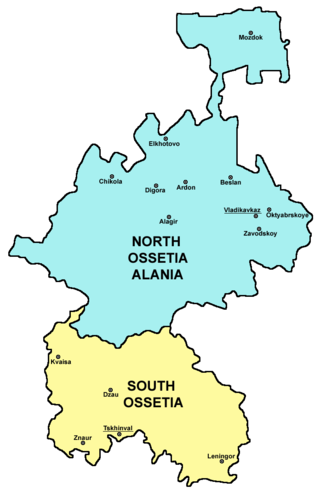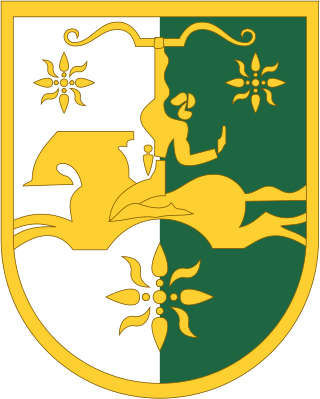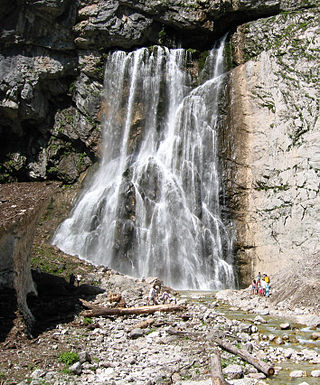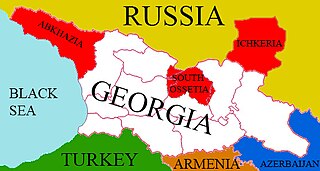Abaza TV is a television station operating in Abkhazia. [1] It is owned by businessman and politician Beslan Butba. [2] [3] It claims to have an independent editorial policy that is not aligned with either the government or the opposition of Abkhazia. [4] The station broadcasts twice a day in Russian and has a news roundup once a week. [5]

Ossetia is an ethnolinguistic region located on both sides of the Greater Caucasus Mountains, largely inhabited by the Ossetians. The Ossetian language is part of the Eastern Iranian branch of the family of Indo-European languages. Most countries recognize the Ossetian-speaking area south of the main Caucasus ridge as lying within the borders of Georgia, but it has come under the control of the de facto government of the Russian-backed Republic of South Ossetia – the State of Alania. The northern portion of the region consists of the, Republic of North Ossetia-Alania within the Russian Federation.

Gagra is a town in Abkhazia/Georgia, sprawling for 5 km on the northeast coast of the Black Sea, at the foot of the Caucasus Mountains. Its subtropical climate made Gagra a popular health resort in Imperial Russian and Soviet times.
Echo TV is a television company. Echo TV is affiliated with Echo of Moscow radio station and RTVi satellite television network. The president is Alexei Venediktov.

Tengiz Kitovani was a Georgian politician and military commander with high-profile involvement in the Georgian Civil War early in the 1990s when he commanded the National Guard of Georgia.

Abkhazia elects on national level a head of state – the president – and a legislature. The president is elected for a five-year term by the people. The People's Assembly has 35 members, elected for a five-year term in single seat constituencies.

Gagra District is a district of Abkhazia. It corresponds to the Georgian district by the same name. In medieval times, it was known as the southern part of Sadzen. It is located in the western part of Abkhazia, and the river Psou serves as a border with Krasnodar Krai of Russia. Its capital is Gagra, the town by the same name. The population of the Gagra town zone in 1989 was 77,079, but this number dropped dramatically following the collapse of the Soviet Union and the 1992-1993 war in Abkhazia,, to 37,002 at the time of the 2003 census. Ethnic Armenians now constitute a plurality in the district.

A constitutional referendum was held in Abkhazia on 3 October 1999, alongside presidential elections. Voters were asked whether they approved of the constitution that had been approved by the Supreme Soviet on 26 November 1994, together with an amendment abolishing the life term for appointed judges and replacing it with five year terms. It was approved by 97.7% of voters. However, ethnic Georgians (200,000–250,000) who had been expelled from Abkhazia during the conflict of 1992–93 did not participate in the referendum and the results were not recognised internationally.

The War in Abkhazia in 1998 took place in the Gali district of Abkhazia, after ethnic Georgians launched an insurgency against the Abkhazian separatist government. The conflict is sometimes referred to as the Six-Day War of Abkhazia; however, this name only takes into account the Abkhazian offensive that lasted from 20 to 26 May 1998, while hostilities and insurgent attacks had already occurred before that date.

In 2007, a series of anti-government protests took place across Georgia. The demonstrations peaked on 2 November 2007, when 40,000–50,000 people rallied in downtown Tbilisi, the capital of Georgia. People protested against the allegedly corrupt government of president Mikheil Saakashvili. Protests triggered by detention of Georgian politician Irakli Okruashvili on charges of extortion, money laundering, and abuse of office during his tenure as defense minister of the country were organized by the National Council, an ad hoc coalition of ten opposition parties, and financed by the media tycoon Badri Patarkatsishvili. Demonstrations occurred both in September and November 2007 and were initially largely peaceful. The protests went downhill by 6 November 2007, but turned violent the next day when the police, using heavy-handed tactics, including tear gas and water cannon, unblocked Rustaveli Avenue, Tbilisi's main boulevard, dislodged the protesters from the territory adjoining to the House of Parliament, and prevented the demonstrators from resuming the protests. The government accused the Russian secret services of being involved in an attempted coup d'état and declared a nationwide state of emergency later that day which lasted until 16 November 2007.

Abkhazia and South Ossetia are separatist regions of Georgia in the Caucasus. Most countries recognise them as part of Georgia, while Russia, Venezuela, Nicaragua, Nauru, and Syria regard them as independent. Russia's initial recognition of the independence of Abkhazia and South Ossetia occurred in the aftermath of the Russo-Georgian War in 2008. The government of Georgia considers the republics to be Russian-occupied territories.
The Armenians in Abkhazia form the second largest ethnic group in Abkhazia after the native Abkhazians. Armenians settled in Abkhazia in the late 19th and early 20th centuries and are now the largest ethnic group in Sukhumi, Gulripshi and Gagra Districts forming 20% of the Abkhazian population with approximately 42,000 out of a total of 242,862.
Beslan Butba is a businessman and a former Prime Minister of Abkhazia. He owns Abkhazia's only private television station Abaza TV and is the chairman of the Party of the Economic Development of Abkhazia. Butba was an unsuccessful candidate in the December 2009 presidential election.
Alexander Javakhishvili was a Georgian rear-admiral and commander of the Georgian navy from 1991 to 1996. A former Soviet navy submariner, he directed efforts at building the navy of independent Georgia in the 1990s.
Egor Kuroptev is a Russian and Georgian political activist and media manager.

Lesbian, gay, bisexual, and transgender (LGBT) people in Abkhazia face severe challenges not experienced by non-LGBTQ residents.
The following lists events in 2017 in Georgia.
The following lists events in 2018 in Georgia.
The COVID-19 pandemic was confirmed to have reached Abkhazia in April 2020.
People's Assembly — Parliament of the Republic of Abkhazia of the 7th convocation is the current convocation of the People's Assembly of partially recognized Republic of Abkhazia, elected in the 2022 Abkhazian parliamentary election.
{{cite web}}: CS1 maint: archived copy as title (link)